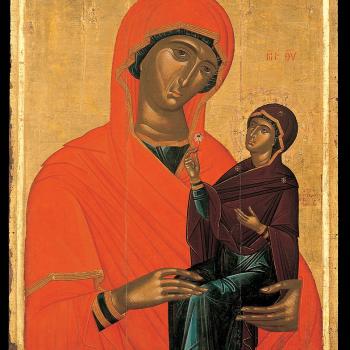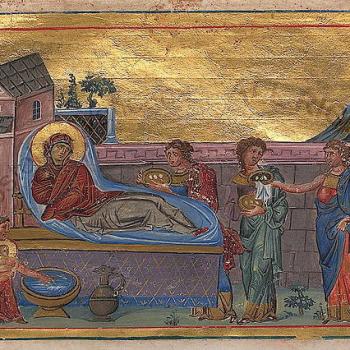![By Tomas Castelazo (Own work) [CC BY-SA 3.0 (http://creativecommons.org/licenses/by-sa/3.0) or GFDL (http://www.gnu.org/copyleft/fdl.html)], via Wikimedia Commons](https://wp-media.patheos.com/blogs/sites/637/2016/05/600px-Mary_and_joseph-300x240.jpg)
Historically, this question was often raised to deal with canonical concerns about marriage, especially when dealing with couples who wanted to divorce and see their marriage annulled. The situation of Mary and Joseph often questioned common-sense understanding of marriage, having canonists deal with couples who apparently did not consummate their marriage, allowing them an annulment in a way which preserved the integrity of Mary and Joseph’s relationship.
Recently, the question emerges with new vitality because of sexual expectations found in modern society. Sex is understood differently now than many times in the past, with more appreciation of it as a relative good, leading many not to understand how in the past virginity was also seen as a good, indeed a higher good, than the relative good found in sexuality. This is something we need to explore further before addressing Mary’s relationship with Joseph because it will help us appreciate that relationship better.
Today, many believe there must be something wrong with anyone who would choose to remain a virgin. The goodness of sex is exaggerated, with the pleasure of sex, a good, being confused as the end and sole purpose of sex itself. While the question of who can or should have sex has often led many to reject the notion that sex should be regulated to marriage, many of those who still hold to that standard view sex as a free gift to be embraced without restraint once a couple is married. It is, for many, the reason for marriage; if a couple gets married, sex has to be involved. So why would Mary and Joseph get married, be seen as husband and wife, if they will not consummate their marriage? Even if Mary had planned to remain a virgin, would that not be cruel to Joseph? And would Mary and Joseph not be rejecting the express command of God to be “fruitful and multiply” (Gen. 1:28; Gen. 9:7) if they married and did not procreate?
The problem here is that we have such a focus on sex, on material pleasure, raising the good contained beyond what it is. This has caused many to have expectations which are not met when they actually find themselves in a sexual relationship, leading them to despair or to believe they have the wrong partner, and so look for a fanciful ideal partner who will never exist. While some of the foundations of the modern sexual revolution were valid, responding as it were to other false standards such as found in Victorian society, the outcome of the revolution was merely an inversion of the past, allowing the same fundamental problems to remain, but now hidden in and through such inversion. There was a need to recognize the good in sexuality against many who considered all acts of sexuality to be tainted with sin, but recognizing the good in sex is not to say sex is all that is good. Sin always involves the unjust elevation of some lesser good above its station and lot, denigrating some higher or greater good. The fact we can find some good in an act does not mean any form of that act will therefore be good. We have to prove the good desired and good obtained, and the means of obtainment, were proper and just. This is what has been ignored, and so, in the end, we have found a way to declare lust as a virtue instead of realizing it to be a vice, twisting the good of sex as way to justify lust.[1]
Thus, we find that what has led to a confusion to our understanding of virginity and its value is that it is not merely sex which is promoted as a good, which it should be, but because it is promoted beyond its value, giving undue expectations as to what that good should be like. We are told it should be pursued as a part of the never-ending hedonistic search for pleasure, for such pleasure is the true good. This is not to say there has not been constant desire for sex and its pleasures throughout the ages, but past generations understood the shame of fornication, even if they gave way to their weakness. Now, we find it is not just the good of sex, but the good of any sex which is seen justified, so that all forms of sexuality, all forms of fornication, are seen as good and without limits so long as the couple involved finds it to be pleasurable. Anyone who questions this pursuit for carnal pleasure and sees that it might need qualifications for it to be justified are seen as outdated, or worse, crazy, for they do not worship at the idol of our new god. They must be converted and worship at the altar of sexuality or fought against in a new holy war to defend the new religious devotion. Thus, society must first try to entice converts to the new sexuality, using the media for its promotion, even to the point of forcing the passions upon the people until they find themselves unable to fight against them and so give in to them, and when they do, tell them they did nothing wrong but have only come over to the realization of the proper good of life. If this does not work, then those who remain opposed to the new sexual standards, those who reject the idol which has been raised, are ostracized, damned as social heretics, excommunicated from society. Even if some do not go far with the new cult because they limit their sexuality to marriage, they believe the ideologies of the sexual revolution as being applicable within marriage; they make sex an omnipresent and absolute good within marriage, so that it still remains a god to rival God.[2]
Sex, while a good, is a limited good. Focusing on it as an end turns the good against itself; by focusing on a limited good as the final good, we are led away from the true and proper final good, God. We are led to think more of the flesh and its desires while ignoring the spirit and its higher, greater forms of good. It is here we begin to see one of the reasons why virginity is so great, and why it is so often fought against in modernity. We are a materialistic society which only understands bodily pleasures. Virginity points to the limit of such an ideology and suggests that there are other, greater pursuits. Virginity gives virgins the opportunity to remain focused upon spiritual goods because they do not have to deal with all the worldly concerns sexuality brings with it. Those worldly concerns usually lead to what we see in society at large: a focus on the body over the spirit, the desires of the body over the needs of the spirit, so that what is a limited good turns our focus away from those greater goods which we should seek while using God as the measure of all things. All around us we see the result of this inversion of goods: we have become spiritually blind, incapable of receiving the promptings of our “spiritual senses.” If sex is not turned into an absolute good, but remains treated as a relative good, capable of being pursued in proper measure, it can be a good to engage, but when we turn it into a fetish, when we become as gluttons for its pleasures, we are no longer pursuing the good, but have ended our pursuit of the good and made sex that end.
More to Come
[1] We must understand the body and its desires have a proper place. There really is a reason as to why we have bodily pleasures. However, as a society, we have turned our whole life and existence as a search for such carnal desires, ignoring the spiritual life and its higher expectations. We should not to be led by the desires of the flesh, but by the spirit, by our higher, reasonable nature (nous, intellect), which can guide the flesh and help it receive its proper due instead of letting its inordinate desires determine our activity without further consideration. When we turn everything over to the body and the pursuit of its pleasures, we allow such pursuits to lead to excess which is detrimental to our personal development. Certainly the spirit, if it is left to itself, could create its own problems, ignoring the good that is within the body, which then leads to other possible sinful conditions like pride, vainglory, prelest (spiritual delusion), and the like. The flesh and spirit must work together as one whole, and so both our physical and spiritual natures must work together, with the spirit (intellect) guiding the flesh in a way which proves to be for the good of the flesh and not its rejection. Each side of our being, therefore, can and do balance each other out, however, because the flesh is less than the spirit in the hierarchy of being, so the flesh’s desires need to be more regulated, and if they are not, more quickly lead us to vice. Thus, when speaking of sexual desire, St. John Cassian pointed out that such a desire has a legitimate end: propagation, and so the desire, and the pleasure with it, were placed in us by God and to be seen as good. It is not the desire, nor its fulfillment, which is the problem. It is how we engage them, seeking bodily pleasure in and of itself without proper restraint based upon its proper use. “For these carnal impulses, of which we spoke above, were with a useful purpose implanted in our bodies by the providence of the Creator, viz.: for perpetuating the race, and raising up children for posterity; and not for committing adulteries and debaucheries, which the authority of the law also condemns,” St. John Cassian, The Institutes in NPNF2(11):249. Now, this is not to say this is the only good found in sex, but it demonstrates how, even in the earliest times, monastics understood there was good to be had even with the pleasure found in sex.
[2] Some who remain opposed to sex outside of marriage do not see the possible problems which can arise when the sexual revolution’s ideologies are accept for sexual activity within marriage. They end up using marriage not for its proper end, but merely as a way to justify lust, to justify a constant pursuit of sexual practices for the sake of any and all pleasures outside of the full and proper order sex is to be engaged. While there are pastoral concerns which can be raised as a result of this problem, the moral questions which arise with the use of condoms and other contraceptives is rarely understood because of this ideology of sex being transposed into marriage (nota bene: because pastoral actions tend toward leniency, as they should, realizing the objective problem with contraceptives should not be the end of the discussion but only its beginning while we try to find a way to right the subjective element which finds it difficult, if not impossible, to meet the objective element in daily life).
Stay in touch! Like A Little Bit of Nothing on Facebook:
A Little Bit of Nothing












